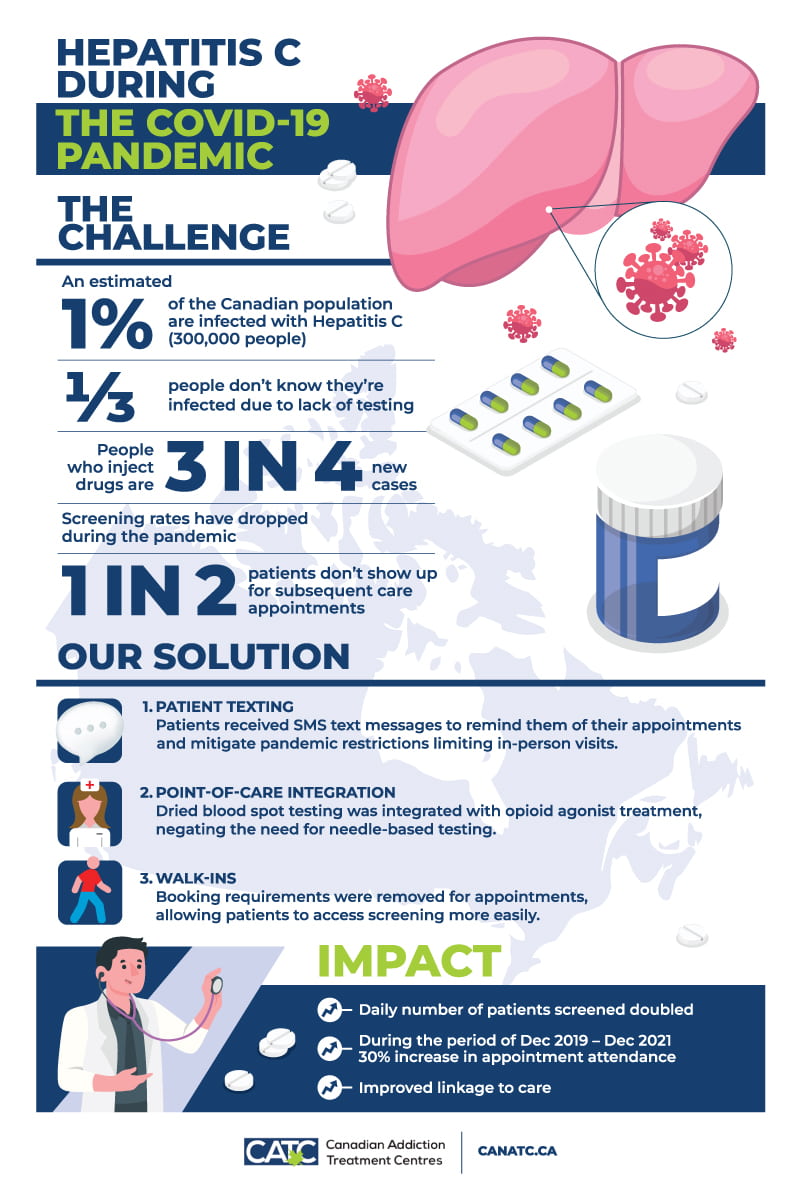How the Pandemic is Making Hepatitis C Worse (and What We’re Doing About It)
How the Pandemic is Making Hepatitis C Worse (and What We’re Doing About It)
Hepatitis C is a serious liver disease that affects an estimated 300,000 Canadians at any given time, with 1 in 3 people not knowing they have it due to lack of access to testing. In Canada, people who inject drugs account for 3 out of 4 new infections, making seamless integration of Hep C and opioid treatment integral in reducing prevalence and transmission of this potentially deadly virus. Unfortunately, the pandemic is making the situation worse—screening rates have declined and half of patients referred to care aren’t showing up to their appointments.
As Canada’s largest provider of Hepatitis C screening and treatment, Canadian Addiction Treatment Centres (CATC) is creating innovative solutions to care that have doubled the number of patients tested daily and increased appointment attendance by 30%.
“Access to Hepatitis C treatment is a major problem for people who use drugs, and the pandemic has only made it worse,” says Kate Johnston, Director of Clinical Services. “The opioid crisis has made it incredibly urgent that we get more people tested and treated, and we need to do it now.”
Innovative Programs for Hepatitis C
July 28th is World Hepatitis Day, sparking a worldwide conversation about a disease that goes undiagnosed and untreated at an alarming rate across the globe. Here at home, CATC treated 450 patients for Hep C last year, and that number is only going to grow as the opioid crisis continues to rage in Canada. Given that early diagnosis is critical in avoiding serious health outcomes, our clinics have been piloting several innovative programs to improve access to testing and treatment that have already proven hugely successful.
These early successes reinforce the critical importance of making Hepatitis C testing and treatment more accessible and connected to care if we are to prevent a rise in serious health outcomes caused by the tainted street supply of drugs.
Working with Indigenous Communities
Building upon this momentum, CATC is currently working in collaboration with several Indigenous communities in Northern Ontario to implement these and other best practices, with the goal of improving access to care where it has been sorely lacking.
“Indigenous People in Canada face systemic barriers to accessing health care, and that includes substance use and Hepatitis C treatment,” says Johnston. “We’re excited to be working with several communities in Ontario to expand access to lifesaving diagnostics and the care they deserve.”
Sharing our Work
We presented our work around Hepatitis C screening and treatment at two national conferences: Canadian Society of Addiction Medicine (CSAM-SMCA) 2022 Scientific Conference and International Network on Health and Hepatitis in Substance Users (INHSU) 2022 10th International Conference on Health and Hepatitis Care in Substance Users.
Read about our CSAM presentation.

